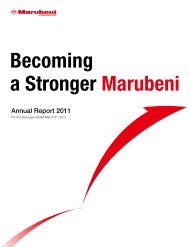Trust Recovery Growth Vitalization - Marubeni
Trust Recovery Growth Vitalization - Marubeni
Trust Recovery Growth Vitalization - Marubeni
You also want an ePaper? Increase the reach of your titles
YUMPU automatically turns print PDFs into web optimized ePapers that Google loves.
Our Commitment to Sustainable <strong>Growth</strong><br />
Environmental issues emerged as a global concern from the late 1980s throughout the 1990s.<br />
As the 21 st century unfolds, conducting eco-conscious business operations is becoming an increasingly<br />
vital task for corporations to attain a society where sustainable growth can be realized.<br />
<strong>Marubeni</strong> recognizes the responsibility that all people and enterprises on Earth today have to<br />
protect our natural environment. It was this awareness that led it to establish the Committee on<br />
Global Environmental Preservation as well as other initiatives, such as the <strong>Marubeni</strong> Group’s Environmental<br />
Policy, in an effort to promptly address environmental issues.<br />
Here at the dawn of the 21st century, people are more conscious<br />
than ever that environmental problems are the most recognizable<br />
threat to humanity’s very survival. As a trading company<br />
involved in a range of different business operations, <strong>Marubeni</strong><br />
has promoted Group-wide measures that take aim at environmental<br />
concerns. Guiding these efforts were the establishment<br />
of the Committee on Global Environmental Preservation in 1990,<br />
the formulation of an environmental guideline in 1991, and the<br />
creation of the <strong>Marubeni</strong> Group’s Environmental Policy as an<br />
upgraded version of this guideline in 1998.<br />
Based on the fundamental philosophy underlying its Environmental<br />
Policy, the <strong>Marubeni</strong> Group recognizes its responsibilities<br />
as a good corporate citizen to do its utmost to preserve<br />
the environmental well-being of the Earth, while striving for the<br />
harmony and prosperity of human society. With this commitment<br />
in mind, all <strong>Marubeni</strong> employees do their part to address<br />
environmental problems in the hope of ushering in a society<br />
where truly sustainable growth can be realized.<br />
In line with the aforementioned philosophy, <strong>Marubeni</strong> is<br />
introducing an Environmental Management System based on<br />
the internationally recognized ISO 14001 standard. This system<br />
will ensure that Group employees around the world share a<br />
common awareness of the <strong>Marubeni</strong> Group’s Environmental<br />
Policy, and will also serve as a tool for dealing with environmental<br />
issues. All divisions at the <strong>Marubeni</strong> Head Office<br />
acquired ISO 14001 certification in August 1999, followed soon<br />
after by branch companies and offices, overseas subsidiaries,<br />
and operating companies. As of March 31, 2005, 35 organizations<br />
within the <strong>Marubeni</strong> Group have received certification.<br />
The <strong>Marubeni</strong> Group’s Environmental Policy is also the driving<br />
force behind <strong>Marubeni</strong>’s involvement in eco-friendly businesses<br />
in an array of fields. Leveraging its unique traits as a trading<br />
company, the company is involved in operations as diverse as<br />
wind power generation, the recycling of PET bottles, and the<br />
conversion of waste construction materials into ethanol, to<br />
name a few. Most recently, <strong>Marubeni</strong> formed a new Emissions<br />
Credits Business Team to promote emissions trading, joint<br />
implementation and the Clean Development Mechanism<br />
(CDM). The adoption of these three “mechanisms” is stipulated<br />
in the “Kyoto Protocol,” the global environmental treaty that<br />
came into effect in February 2005.<br />
Another key action by <strong>Marubeni</strong> is its cooperation with<br />
different groups working to tackle environmental problems.<br />
Here, <strong>Marubeni</strong> provides support to TRAFFIC, an NGO<br />
managed jointly by the World Wildlife Fund (WWF) and the<br />
International Union for the Conservation of Nature and Natural<br />
Resources (IUCN) to monitor international trade in wild<br />
animals. In 2003, <strong>Marubeni</strong> assisted in the publication of<br />
educational leaflets about the Convention on International<br />
Trade in Endangered Species of Wild Fauna and Flora (CITES),<br />
also known as the “Washington Convention.” In the fiscal year<br />
ended March 31, 2005, this was followed by support for the<br />
creation of a website on the convention.<br />
Details of <strong>Marubeni</strong>’s environmental programs can be found<br />
in the <strong>Marubeni</strong> CSR Report and on its<br />
website. Going forward, <strong>Marubeni</strong> aims to<br />
use these and a host of other tools and<br />
opportunities to provide fair and accurate<br />
disclosure of such information within and<br />
outside of the Group, with a view to gaining<br />
the understanding of the public with regard<br />
to its activities in this area.


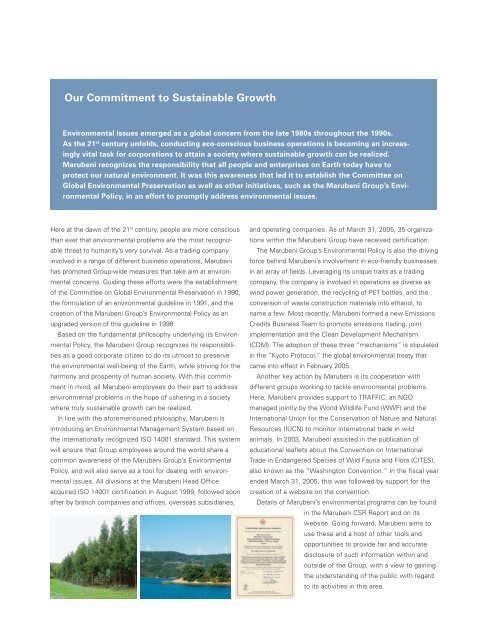
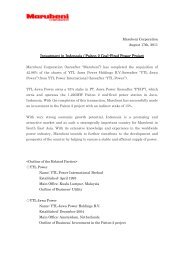
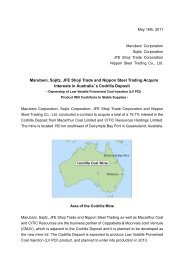
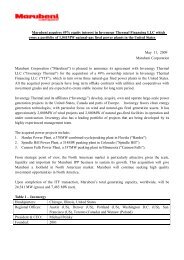
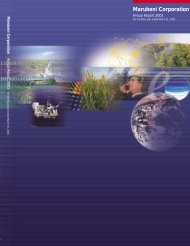
![[Chapter 2] Driving Growth: Expansion Under SG-12 - Marubeni](https://img.yumpu.com/4161147/1/190x248/chapter-2-driving-growth-expansion-under-sg-12-marubeni.jpg?quality=85)

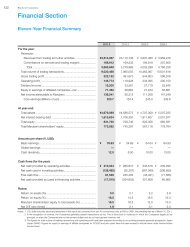
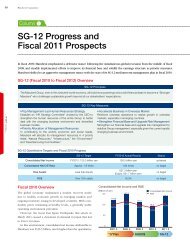
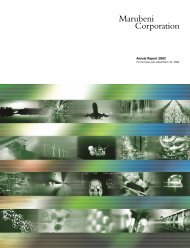
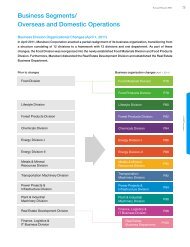
![[Chapter 4] Delivering Growth - Marubeni](https://img.yumpu.com/3464783/1/190x248/chapter-4-delivering-growth-marubeni.jpg?quality=85)
